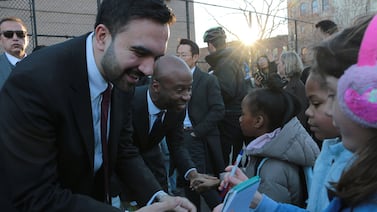New York City’s education department will move 1,000 central and borough-level staff to district offices, Chancellor David Banks announced on Friday.
Staffers will be pulled from central leadership, First Deputy Chancellor Dan Weisberg’s office, early childhood education, and from borough offices “to more effectively support schools in coordination with district superintendents,” according to a news release about the restructuring.
Borough offices — which a spokesperson said will no longer exist after the administration’s shake-up — each have traditionally served multiple districts. They’re staffed with people who are supposed to help schools with things such as assessments and screening, planning lessons, and analyzing student data.
Officials did not share what most of these 1,000 staffers currently do, or how exactly their jobs will change once they move into their new roles.
Staff will be moved to superintendents’ offices “to be used in direct support of schools,” said spokesperson Nathaniel Styer, who said that the change removes a bureaucratic layer in providing schools with direct support. For example, Styer said, social workers will be working with schools in “maximizing social-emotional support” for students.
About 100 of them are social workers from the early childhood division who, once moved to district offices, will focus on “high-need communities,” such as students who are living in temporary housing, officials said. City officials had promised last year to equip each school with at least one full-time social worker or access to a school-based mental health clinic; Styer said Friday that they’ve achieved that goal.
“As we continue the work to reimagine the education we provide, it is critical that our central and borough staff are moving closer to the communities, schools, students, and teachers they serve,” Banks said in a statement. “Our Superintendents are accountable for partnering with families and schools to meet the needs of their communities and improve the school experience of our students, and these personnel are being reassigned to support those efforts.”
The move represents Banks’ second shakeup of the education department’s bureaucracy and leadership. He first eliminated the nine executive superintendents appointed by his predecessor, Richard Carranza, and required district superintendents to reapply for their jobs. That process met with some backlash.
Friday’s announcement appeared in line with early priorities set by Banks. In his first official agenda-setting speech, Banks said he wanted to give superintendents more staff and resources and signaled that he was considering cuts at borough offices.
The city teachers union applauded the move.
“Any time we move resources closer to the schools, it is a win for our students and our school communities,” said Michael Mulgrew, president of the United Federation of Teachers, in a statement.
The principals union did not immediately respond for comment.
Some central office staffers are already questioning what the move will achieve. One central office employee within the city’s early childhood division — an area where some of these 1,000 staffers will be moved from — said there’s still no clarity about what this plan will mean for her office.
“I have no words for their inability to create a clear plan,” said the staffer, who requested anonymity because she was not authorized to speak with the press. “It’s not clear what actually is happening.”
One example of what the reorganization will look like on the ground: This staffer was informed Friday that all of the city’s 185 early childhood instructional coordinators, who work directly with 3K and prekindergarten providers, will be excessed — which Styer confirmed, adding that there will be available jobs for each person. “Excessing” means the employee would lose their current job, but would continue earning a city paycheck while they reapply to jobs within the system.
Those workers will be encouraged to apply for new instructional coach positions as part of this reorganization, the staffer said — but she has yet to receive any more details.
Reema Amin is a reporter covering New York City schools with a focus on state policy and English language learners. Contact Reema at ramin@chalkbeat.org.






